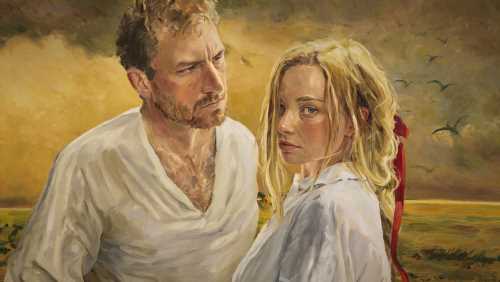Oscar-Nominated ‘Loving Vincent’ Duo Talk Toronto-Bowing, Hand-Painted Animated Feature ‘The Peasants’

Six years after “Loving Vincent,” their groundbreaking biopic of the Dutch painter Vincent van Gogh earned an Oscar nomination and raked in more than $50 million at the global box office, the filmmaking team behind that hit is back with a bigger, more ambitious animated feature that utilizes the same stunning hand-painted animation technique to tell an operatic story of life and love in a 19th century Polish village.
“The Peasants” world premiered Sept. 8 as a special presentation at the Toronto Film Festival. The film is based on the novel by Nobel Prize-winning author Władysław Reymont and follows a young woman who’s determined to follow her heart in a God-fearing village where homespun traditions of family and faith rigidly define the roles of each member of the community. Forced to marry a wealthy, widowed landowner despite her love for his son, she sets off on a collision course that ultimately turns the village against her — and propels her into a desperate fight for her independence.
Directed by D.K. Welchman (formerly known as Dorota Kobiela) and Hugh Welchman, the anticipated follow-up to “Loving Vincent” uses the same animation technique that dramatically brought the paintings of van Gogh to life in the duo’s Oscar-nominated debut. The undertaking involved shooting a live-action feature and then hand-painting the footage onto canvas, working with a team of more than 90 animators in four countries who tallied more than a quarter of a million hours between them.
In scale, scope and ambition, say the filmmakers, “The Peasants” goes far beyond its critically acclaimed predecessor. “The only similarity is that we are painting oil on canvas, and the incredible hardship that goes with making an independent film that has such a complicated technique,” says D.K. Unlike “Loving Vincent,” which consisted largely of interviews with “talking heads,” notes her co-director, “The Peasants” is “the story of a community with some huge set pieces” that required a higher degree of difficulty to bring to life.
The plot unfolds over the course of four seasons in Lipce, a small farming community where the rhythm of daily life is attuned to the natural cycle of the harvest. It is a village of colorful festivals and raucous celebrations, of vicious gossip and bitter family feuds, and a world where women must fight to carve out their place.
“It’s a very patriarchal society,” says Hugh. “And the women, to find a space in this world, they have to be both cunning and feisty.” The film’s heroine, Jagna, “is feisty, but she lacks cunning,” he adds. “She is guileless, she’s a dreamer, she’s an artist.” While other women in the village use whatever means necessary “to find a space within this patriarchy,” it’s the rebellious Jagna who insists on questioning the society’s double standards. For that, she’s forced to pay a heavy price.
Though the agrarian, 19th century world of “The Peasants” is in many ways unfamiliar to our own, D.K. says she nevertheless took a considered approach to ensure that the themes of the novel feel contemporary to a modern viewer. “I wanted this adaptation not to just be an adaptation. I wanted to send a message … [and] engage with society at large,” she says. Hugh adds: “We were amazed at how relevant it was today.”
“The Peasants” is produced by Hugh Welchman and Sean Bobbitt of Breakthru Films. The company, which was founded by Welchman, won an Oscar for best short animated film with “Peter and the Wolf.” New Europe Film Sales, which is repping the film globally, has already closed a slew of deals ahead of the film’s world premiere.
Read More About:
Source: Read Full Article